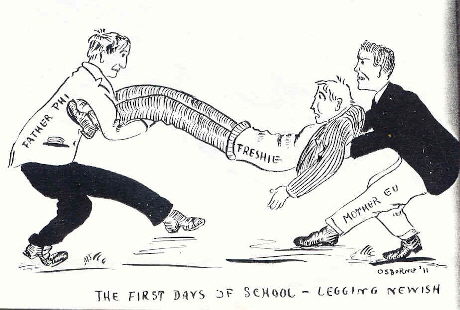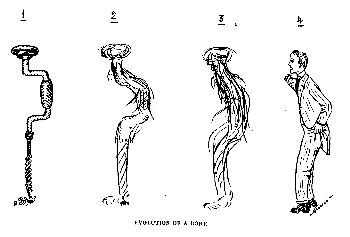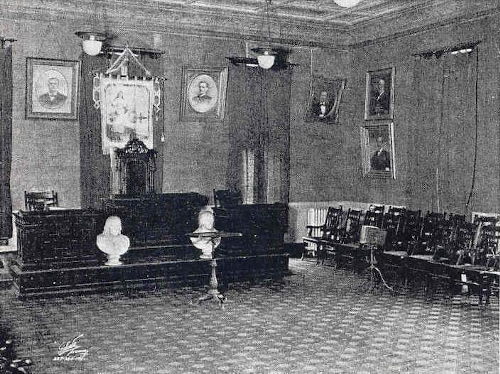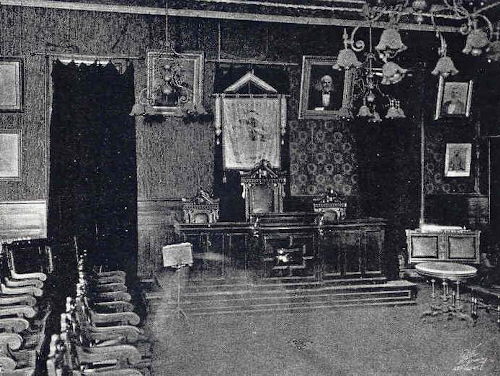The Literary Societies
By G. W. Paschal
The Philomathezian and Euzelian Literary societies were organized on February 14, 1835, shortly after the beginning of the second session of Wake Forest Institute. At that time the students numbered about seventy. These were divided by lot between the two societies, Mr. James C. Dockery, of Richmond County, casting the lots for the Philomathezian Society, and Mr. Hiram K. Person, of Moore County, casting those of the Euzelian.
Great interest was taken in the societies from the first. Soon an intense rivalry had developed. A writer in the Biblical Recorder of September 16, 1835, says: “A very unhappy state of things existed among the students during the latter part of last term. The two societies absorbed all feelings and all interests. Jealousies arose, and then ” antipathies, and hostilities were carried so far that violent prejudices divided brethren of the same profession. This state of things became quite alarming, and the question frequently occurred, Tantaene animis caelestibus irae!” An armistice came with the great religious revival of 1835, but throughout the remainder of the nineteenth century the halls of the two societies were much like two armed camps. There was always a bitter fight for new members, and many a stratagem to get them. On the institution of the celebration of Anniversary in 1854, as there were at first only orations, society was clearly pitted against society, and hostilities came out into the open. When, in 1872, the public debate was added precaution was taken to arrange the speakers so that a member of one society might have as his colleague a member of the other. Under any other arrangement there would have been danger of a much more serious battle than one of words. This rivalry, however, had its better side, and society men of former days have looked upon its weakening as an evidence of decadence. It created and maintained a strong devotion of the members to the societies. Under its influence students would attend long sessions of debate without grumbling, often in the early days, as President Poteat says, sitting through long winter evenings in unheated halls, wrapped in heavy overcoats, and with hot bricks at their feet. Men of the upper classes were faithful to attend, and, as sympathetic critics, lend the advantage of their experience to the training and development of the neophytes. Another very valuable feature of the societies until recent years was the business meeting. This was a pure democracy. It was here that the character of the men became known. If one was a weakling, he could not conceal it; if he had the qualities of leadership they soon became manifest; if he was lacking in moral fibre his fellows found it out. One’s society mates also knew his financial status; if he had money, they used him with a will where individual expense was involved; if he was a poor fellow struggling to make his way through college, they were lenient and sympathetic and sometimes able to help. The society chastened every member with its firm but reasonable discipline, and in the humblest stimulated respect for himself as worthy to he a member of a brotherhood in which everyone was set for the improvement of himself and every other. There was a mutual loyalty which was not forgotten outside the society hall.

The first public appearance of the societies was on July 4. 1835. The exercises of that day were in their charge and the oration was by Mr. James C. Dockery of the Philomathezian Society. At eleven o’clock in the morning the two societies formed in line and marched to the residence of President Wait, where now stands the Administration Building, and received their banners from the hands of Mrs. Wait, who with Dr. Wait and the presidents of the societies, was standing in the balcony, so high up that the standard bearers had to he raised on the shoulders of their mates, These Banners, probably designed and made by Mrs. Wait were of silk. The Philomathezian white instead of red as at present and the Euzelian blue. As is evident from the speeches of presentation made by Mrs. Wait and the closing paragraphs of Mr. Dockery’s oration, these banners were already painted with their present symbolic designs and contained the society mottoes, Inventiam viam aut faciam (Eu.) and Esse quam videri malo (Phi.). Something of the enthusiasm of the occasion may be understood from the following words of the chronicler of the events of the day: “the banner was then handed to the standard bearer (Phi,); the hand played “Hail Columbia,” the speech, the silken folds of the banner gracefully waving in the breeze, the countenance of the young men intensely interested, the music, the silent wave of the hat, produced a sensation that forced eyes to glisten with tears.”
Until 1854 the societies celebrated their anniversary each in its own hall. In that year, as has been said, was the first public celebration. with orations, one by a representative of each society. With the addition of the Public Debate in 1872, the celebration has continued unchallenged to the present day, except that beginning with 1925 the day was changed to February 1-2. The Society Day, consisting also of a public debate and orations, about the last of October, was added in 1914. In 1897 was the first intercollegiate debate. This was in Raleigh with representatives of Trinity College. The list of men who have participated in the public functions of the societies is in itself sufficient evidence of the value of the society training. It would be hard to make up another list of North Carolinians who have none a more beneficial and honorable service to church and State. Among the preachers are White, Pritchard, the Dixons. E. M, Poteat; amongst the lawyers Covington, Gulley, Meekins; among the statesmen the Kitchin, Bickett, Webb; among the teachers and college executives Poteat, Riddick, Sikes. And there are five hundred others.

To the societies is due also the beginning of the College Library. Until the completion of the Heck-William. Building in 1879 the societies each had its own books on shelves around the walls of its hall on the top floor of the old dormitory building: halls which had been assigned to the societies on the completion of the building in 1838. On moving to their present halls the societies donated their books, numbering nearly eight thousand, to the College, and turned over to the College the collection of library fees.
History of the Societies
The first work of the second session was the organization of the Literary Societies in February, 1835. Professor Armstrong delivered an address on “The Importance of Polemic Societies.” After this address it was voted to organize two societies. Hiram K. Person and .James C. Dockery, two of the more mature students, were appointed to divide the student body. They did so. Those chosen by Person became the Euzelian Society, and those by Dockery the Philomathesian. Person became the first President of the Euzelian C. R. Merriam of the Philomathesian, while George Washington was only Vice-President. When the new building was completed in 1838, these societies were given homes in it. The most striking feature in the history of the life in Wake Forest College has been the influence and power of these societies. The affection for them and the adoration of them is the finest specimen of college spirit. This feeling began at once. These boys of the Institute were very fond of display and celebration: Professor Wait himself was in full sympathy with them. On each Fourth of July some kind of celebration was held. The representative of one society would deliver an address and one from the other would read the declaration of independence. After one of these celebrations the following record is found in the Euzelian Society:
Half box of raisins. . . . . . . . . . . . . . . . . . . . . . . . . . . . . . . . . . . . .. $2.50
Prunes. . . . . . . . . . . . . . . . . . . . . . . . . . . . . . . . . . . . . . . . . . . . . . . 1.50
6 1bs almonds. . . . . . . . . . . . . . . . . . . . . . . . . . . . . . . . . . . . . . . . . 1.50
Half jug lemon syrup. . . . . . . . . . . . . . . . . . . . . . . . . . . . . . . . . . . . .2.30
Half bottle rose oil. . . . . . . . . . . . . . . . . .. . . . . . . . . . . . . . . . . . . . . . 30
The records of these societies, which have been kept in good order since the first session, show that the standard of parliamentary procedure was placed unusually high. Every committee reported and the report was recorded. A vote of thanks was recorded for every person who showed them any favor. Between the two societies there existed the most dignified, formal and courteous relations. The records show that they continually thanked and counter-thanked each other. It was, therefore, surprising to find in the record of the Philomathesian society a rather testy resolution resolving “that the Euzelian Society be allowed to select the Commencement speaker provided they choose Judge Gaston.
How different were the queries of those days! There was no wrestling with Trusts, Railways Injunctions, and Ship Subsidies. Here are some of their queries. The first query ever discussed in the Euzelian Society was, “Resolved, that there is more pleasure in the pursuit than in the possession of an object.” The decision was in favor of the negative. “Is it judicious in the government to force the Indians to move contrary to their wishes?” “Would it be policy in North Carolina to establish a penitentiary?” “Was Brutus actuated by love of country in murdering Caesar?” “Is Slavery as practiced in the United States incompatible with the spirit of free institutions?”
These societies have continued their work throughout the seventy-four years of their existence–save the years of the Civil War. In 1862 the Euzelian Society resolved that their records be placed with Mrs. ——– for safe-keeping till we meet again. In the Philomathesian Society following pathetic entry, dated January 27, 1866, and probably written by the late Dr. W. R. Gwaltney:
“On that day after a three and a half the Philomathesian Society was reestablished under most favorable auspices. What a blessing it is that we are permitted to meet in this magnificent hall and become members of this hollowed society. Only two old members were again assembled, and it is heartrending to think that many of the noble founders and perpetuators of this association are, some, of them, filling honorable graves on Virginia’s soil, while we are proud to know that many of them are filling those honorable stations in life which the Almighty has so wisely ordained. We but lament the untimely fate of the honored braves who have fallen for their country’s sake.”
Dr. E. W. Sikes in Wake Forest Bulletin. As reprinted in the 1909 Howler, p. 114
Phi’s Had Membership Problem in 1850’s
Old Gold and Black. Oct. 24, 1955
By DAVID HUGHES
The two literary societies have dwindled a lot since the days when as many as 500 men were enrolled in each; the enrollment of the College was not much more than the total membership of the Euzelian and Philomathesian societies.
Fraternities took the place of the societies in the social life of students. But fraternities do not replace the need of students for a literary outlet. To that end, both societies provide an outlet.
Fraternities have been pitted against each other since their beginnings here in 1922. The societies did the same in years before that time.
Needed Members
There was a time when the Philomathesian Society faced a problem facing many fraternities: that of getting new members. In 1854 the Eus gained 19 members at fall enrollment, while the Phi’s got only one. In the following spring, the Eu’s took 20 to the Phi’s eight.
Phi officers supposed that the cause of this was the greater number of Eu’s on the faculty. Four professors belonged to the Euzelian Society; none were Phi’s. To correct the situation the Society sent a resolution to the Board of Trustees in June, 1856:
” . . . Be it resolved by .the Philomathesian Society, That, the Board of Trustees by and is hereby memorialized to correct as near as possible the evil now presented to their consideration by grant in this Society an equal representation in the Society as soon as practicable.”
Prof. Resigned
The resolution brought about the resignation from the faculty of one of the Eu professors. It still, however, left the Phi’s with only one representative. The Trustees corrected this with the replacement of the resigned professor with one that belonged to the Philomathesian Society.
This satisfied the Phi’s, and the societies settled into their routine or weekly debates and speech contests.
The constitutions of both societies provide that all persons of distinction are eligible for election as honorary members, and a reading of the minutes of the societies would suggest;. that about all who were eligible were elected. Hardly a year passed that each society did not elect a score or more.
Clay Enrolls
In the College Library, still preserved, are letters of acceptance from many famous men in history. The Phi records show one from Henry Clay in 1835:
“Gentlemen: I have received your favor communicating the wish of the Uhilomathesian Society of the Institute at Wake Forest to place my name on the list of its honorary members. Greatly obliged by the friendly sentiments towards me which prompted that wish, I take particular pleasure in acceding to it, and shall feel honored by the association of my name with those of the members of the Society. : .”
Another from James Iredell, Justice of the Supreme Court of the United States, said in part: “I feel much flattered by your proposal to enroll my name as one of the honorary members of the Philomathesian Society of the Wake Forest Institute and accept the offer with great pleasure. . .”
Phi’s Expand
To meet the challenge which changing times and competition from these other organizations has imposed on the literary societies, the Phi’s have expanded the horizons of the society. This year marks what might easily be called the beginning of the “new look” in literary societies. Without sacrificing any of its’ traditional quality, new aspects of culture are being injected into the society.
Added to the accepted literary functions of debate and literature have been investigations into current accomplishments in the various arts, studies of great music, exploration of pertinent college occurrences from a literary point of view, and creative work.
The two programs presented thus far this year demonstrate this new approach. The first program dealt with the college removal program. Included were both its serious and not so serious aspects, as a well balanced program should. For example, a senior told of the feeling. of the seniors who will have no familiar college home to return to as Alumni. Contrasting that melancholy note were the observations of that immortal poet, Shakespear, as he viewed the situation.
Combine Music, Poetry
The second program combined the music of the masters with great poetry appropriate. to the mood of the music. In this program, the beauty of both immortal poetry and music were intertwined in an effective performance.
In the forthcoming weeks further journeys into untried literary fields will be launched. To the student who appreciates the need for the finer thing’s in his life, these programs will be of great interest.
Under. the leadership of, its president, Ken Freeman, this year the Philomathesian Literary Society is blazing a pioneer trail in the’ field of literary societies. Mindful of its past, yet realizing that an organization’s justification for existence lies not in a dusty, ornately bound past, but in a vital, useful present. Philomathesian looks forward to the challenge of the future eagerly.
The societies exercised dominant campus power and overtime became “rule-bound” and hierarchical. The pressure to reform, modernize, and become more inclusive are evident, as with any established and hegemonic group. The 1909 Howler offered “criticism” vis-à-vis parody. The following resolution indirectly reveal how the societies were structured and the means of honoring members at the turn of the century.
Resolutions
WHEREAS, Messrs. Dailey, Koontz and Williams, Chas. T. Bell, O’Brian and Battle have seen fit to bore their respective societies at each session, therefore be it Resolved, That the members of these societies provide special sessions so that these bores may rid themselves of superfluous oratory and debate.
RULES AND REGULATIONS GOVERNING THESE SESSIONS.
- That these meetings shall be optional to the members of the societies.
- That there shall be two meetings a month-the first and last Tuesday night of each month.
- That these meetings shall be held in the rear end of the Chemical Laboratory.
- That the speakers shall be allowed to select their own questions for debate.
- That the president of the newish class shall preside over these meetings.
- That each speaker may occupy the floor as long as he wants to on his first speech, but must speak three hours or be fined five dollars.
- That each speaker shall be allowed two hours on miscellaneous.
- That a fine of ten dollars shall be imposed upon anyone of the speakers for nonperformance of duty.
- That the president shall receive in payment for his services all fines imposed.
- That for failing to pay any of these fines the owner shall receive the censure of his society and not be allowed to run for office in the society.
- That the president shall appoint a committee of three to solicit funds throughout this and other States to pay for the GAS used at these meetings.
- That a medal, costing not more than twenty-five cents and not less than fifteen cents, be given to the one who speaks the greatest number of hours during the college year. This medal shall have engraved on one side the name of the winner and on the other side the following motto:
Sic semper tyrranis. By dingibus.
Ego summus taurus meae Societatis sum!
Read more: Literary Societies at Wake Forest College (Timothy Williams, May 2002)


